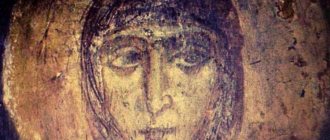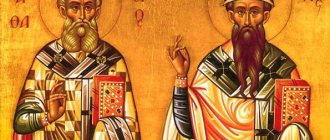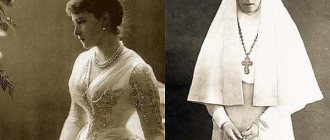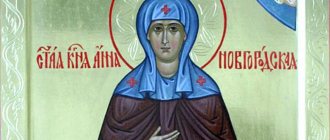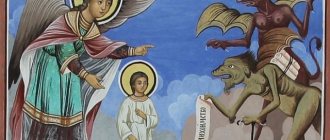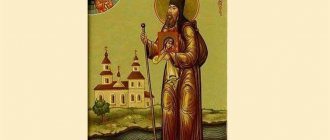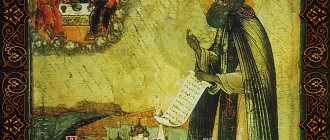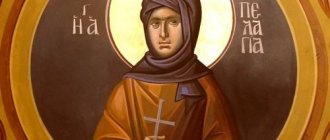Venerable Euphrosyne of Polotsk is the mother of female monasticism in Rus', the first abbess of a monastery for women, an example of asceticism and spiritual purity, a mentor of Russian women, called by God to care for them both in the past, present and future.
Having given birth in the lands of present-day Belarus, died in Jerusalem, and was buried in the Pskov lands, this fragile woman became a symbol of the unification of Russian lands and Christians around the world. On May 23, the Orthodox world pays tribute to the memory of St. Euphrosyne, who still brings joy to the world.
short biography
The name of Princess Euphrosyne is not mentioned in the chronicle. Her biography and origin story are reconstructed only from her Life, compiled before the Mongol conquest. The Life has been preserved from more than a hundred lists, which began to be formed back in the 15th century.
Origin
Before her monastic life, Euphrosyne of Polotsk bore the name Predslava, she was the daughter of George Vseslavich, a representative of the princely dynasty, and the great-great-granddaughter of Saint Prince Vladimir. From an early age she studied the basics of spelling, read the Psalter, Holy Scripture and various religious books. The girl not only loved to read, but also often prayed, which surprised all her relatives. Over time, the fame of Euphrosyne spread beyond the borders of the Polotsk lands, and many princes began to ask for her hand. The young girl rejected all offers and declared her desire to enter a monastery, despite her father’s ban.
Serving God
At the age of 12, the parents of the future princess wanted to forcibly marry her to the princely person. Then the girl secretly left her home, came to the convent and declared her desire to tonsure her aunt, Abbess Romana. Due to her young age and unusual external characteristics, the abbess considered that monasticism would not suit the girl, but her deep intelligence and focus made her change her mind. Despite the prohibition of the girl’s parents, the abbess gave her blessing for the tonsure.
It was during her tonsure that Predslava acquired the name Euphrosyne. At first she served in a monastery, but a measured life with many restrictions did not correspond to her impulses to accomplish a sacred feat. Having received permission from Bishop Elijah, Euphrosyne went into seclusion and began to live in a cell located at the St. Sophia Cathedral, where she prayed, read and copied religious books, gaining new knowledge. Later, the author of the saint’s life wrote that in this way the nun was able to fill her heart with God’s wisdom.
Benefits
Euphrosyne’s church exploits and works, aimed at spiritual development, were always combined with active love for others. The girl gave the rewritten spiritual books to everyone who needed religious enlightenment.
After strengthening the princess’s spiritual powers, an angel appeared to her and indicated that she would become the founder of a new monastery. With the same instruction, the angel came to the bishop and showed him the place near Polotsk where the monastery should be located. Euphrosyne followed the instructions and later opened a convent, where she became abbess for the first time. Her sister and cousin were tonsured as nuns in this monastery. Cousin Zvenislava donated all her jewelry and outfits to the monastery, which were originally prepared for her wedding.
In her free time from church ceremonies, the Polotsk princess was engaged in the census of manuscripts, so she was considered the first Russian female librarian.
Previously, such a task was considered exclusively male and required serious physical force. To copy the book, the parchment was placed on the left palm, and the bent arm was leaned on the leg. It was necessary to write in large and even letters, without the slightest tilt. Copying books required perfect grammatical knowledge and creative talent, since the first letters of texts and headings were traditionally decorated with ornaments. Working hard all day, I managed to copy no more than four pages.
A share of the rewritten texts was sold to wealthy monasteries, and all funds received were distributed among the poor. For poor churches and monasteries, Euphrosyne worked for free. At many monasteries, separate workrooms were opened for the census of sacred books, in which new masters appeared, making colored ornaments, drawings, and hard covers. Schools also began to function, where everyone could learn to read and write.
The end of life's journey
In the final years of her life, Princess Polotsk made a pilgrimage at the direction of Bishop Dionysius. Taking with her her brother and cousin, she first visited Constantinople and then went towards Jerusalem. In 1173, the princess reached the holy land and was able to bow before the Holy Sepulcher. After this, she received news from an angel that she was destined for eternal rest. As a result of a serious illness that lasted 24 days, Euphrosyne died, and her body was laid to rest in the monastery of St. Theodosius, not far from Jerusalem. Several holy wives were previously buried there, including the mothers of Saints Sava and Theodosius.
Euphrosyne's Dream
Mother Euphrosyne dreamed all her life of visiting Jerusalem, touching with her own hands the places where Jesus was, and dying where the Savior died. Around 1167, her dream came true; accompanied by her sister Eupraxia and nephew David, she came to the Holy Land, met the emperor, and then constantly prayed in the church of St. Sofia in Constantinople.
They managed to get to Jerusalem, which was under the rule of the Latins, staying at the Russian monastery of the Mother of God. Russian pilgrims tremblingly donated gold, incense and a censer to the Church of the Holy Sepulcher. Soon the monk fell ill, rested quietly on May 23 and was buried not far from Jerusalem in the monastery of Theodosius the Great.
The news of mother's death reached Polotsk. Since then, every year, on May 23, Orthodox believers give God praise for the humble daughter of God, who has become a lamp for Russian female monasticism.
Veneration and significance of the saint in Orthodoxy
The veneration of St. Euphrosyne in the Polotsk domains began at the end of the 12th century. At that time, the service of the saint and the hagiographic Life compiled in one of the monasteries opened by Euphrosyne were in effect. Of more than a hundred lists of lives, the most famous was the Life of Polotsk Euphrosyne. In the 16th century, two new editions were created.
Traditionally, the image of Euphrosyne is considered sacred not only in Orthodoxy, but also among Catholics and in the Uniate churches. All believers often recall the following merits of the princess:
- The erection of the Transfiguration Cathedral, which is still preserved in its original form. The cathedral is considered an ancient monument, and it is the only temple in Belarus where paintings from ancient times remain.
- Significant influence on social life in Polotsk in the mid-12th century. Euphrosyne defended the rights of Polotsk residents and helped them become independent.
- Political actions and repeated attempts to improve relations between warring princes. The princess often tried on the role of peacemaker.
The official day of memory of the Venerable Euphrosyne is June 5. On this day, believers pray and remember the princess.
Akathist to St. Euphrosyne of Polotsk
Kontakion 1
Let us today praise the chosen bride of Christ with songs, Vernia, Euphrosyne; This princess, having left her father’s house and lived well in monasticism, has guided much towards salvation; Having passed away in the flesh in Jerusalem, He has taken up His abode in Jerusalem on high in spirit, and there He continually prays for us. Let us cry out to her: Rejoice, Euphrosyne, all-honorable bride of Christ.
Ikos 1
Having lived an angelic life, reverend, you pleased Christ with your fasting life, and you were granted heavenly joy to receive communion after your death. Also, from the heights above, look down upon us, so magnifying you: Rejoice, praise of the Russian land; Rejoice, glorious branch from the family of Vladimir Equal to the Apostles. Rejoice, God's chosen child of eminent parents; Rejoice, immaculate dove. Rejoice, pure virgin; Rejoice, consolation to nuns. Rejoice, guide to heavenly Jerusalem; Rejoice, star of piety. Rejoice, intercessor of those who flow to you; Rejoice, invisible healer of ailments. Rejoice, warm intercessor for us; Rejoice, Euphrosyne, all-honorable bride of Christ.
Kontakion 2
It was a joyful vision when, after your birth, you, the glorious one, were brought into the temple of the Lord: there, in the baptismal font, you were washed from original sin by immersion, and with the sacred anointing of the world you, like a young branch, were grafted by the priest to Christ, so that you might eat Him I will bring forth with His elect: Alleluia.
Ikos 2
With a mind, enlightened from above, and a pure heart of Christ, you entrusted it to yourself from your youth, Preface; often flowing into the temple, you constantly remained in the upper room in labor. In the same way we please you: Rejoice, betrothed to Christ from the baptismal font; Rejoice, sealed with the world of grace. Rejoice, pure receptacle of the Holy Spirit; Rejoice, you who have become wise for salvation. Rejoice, strengthened from above for good; Rejoice, you who enlightened your mind with prayer. Rejoice, having acquired a strong conscience for good; Rejoice, having led away from your youth the path of piety. Rejoice, for you have turned away from the path of destruction; Rejoice, hardworking maiden. Rejoice, beautiful young maidens of Russia; Rejoice, Euphrosyne, all-honorable bride of Christ.
Kontakion 3
Strengthened by the power of the Most High, you loved the venerable one; book learning and you were diligent in this; Having comprehended the wisdom of books, you chose divine books above all others, and those who can make you wise for the salvation of every person, you zealously revered them, sweetly singing to the Lord: Alleluia.
Ikos 3
Today your monastery is filled with young and many young women, who are taught books here. For this reason, we earnestly pray to you, O all-praised one, look upon you and make me wise for salvation, and let us magnify you: Rejoice, thou who hast sought the key of wisdom; Rejoice, for you have mastered the art of books from your youth. Rejoice, having thus opened the doors of the knowledge of God; Rejoice, you who read the Holy Scriptures. Rejoice, for this reason you have seen the creation of this world; Rejoice, touched by Christ’s indescribable condescension to our fallen race. Rejoice, thou who has loved the Lord who loved us; Rejoice, you who desired to work for the One. Rejoice, come and dwell in the palace of His glory; Rejoice, virgin, invisible assistant to young virgins in learning. Rejoice, lamp of piety and knowledge; Rejoice, Euphrosyne, all-honorable bride of Christ.
Kontakion 4
Having fled the storms of everyday troubles and misfortunes, O venerable one, you loved the virgin life more than marriage, and you turned away from eminent suitors, O maiden, so that you served the only Heavenly Bridegroom Christ, singing to Him: Alleluia.
Ikos 4
You have heard, venerable one, what the apostle said: I say to the unmarried and to widows, it is good for them, if they remain, as I did; Even if they marry, they encroach; He who is not married fears to please the Lord; and you were jealous of this. We also magnify you: Rejoice, pure virgin; Rejoice, you who have chosen the path of monastic life. Rejoice, for you were able to accept and embrace the lot of virginity by God’s grace; Rejoice, you who have escaped worldly worries. Rejoice, you who have sought a quiet refuge; Rejoice, you who imitated Mary Lazarus. Rejoice, for in the temple, as if at the foot of Christ, you rushed about; Rejoice, for you have joined the face of the martyrs and venerable women. Rejoice, thou who despised the beauty of the corruptible world; Rejoice, unspeakable joys in the heavenly world today, partakers. Rejoice, image of a righteous life; Rejoice, Euphrosyne, all-honorable bride of Christ.
Kontakion 5
Fearing God, you were not afraid, Euphrosyne, of the hardships of a monastic life, but having left your father’s blood, you came to the monastery and clothed you in an angelic image with the tender abbess, so that, not obliging yourself with the purchases of this life, you would take out the song, being worthy of Christ: Alleluia.
Ikos 5
You prayed to the Heavenly Physician, O all-praised one, that the sorrow caused by your parent’s departure would be transformed into joy; For I have left you, venerable one, so that you may serve Christ for those who gave birth to you and pray. We also praise you worthily: Rejoice, chosen one of God; Rejoice, mystery, who has departed from her father’s home. Rejoice, you who have entered the monastery of the Romanov princesses; Rejoice, having laid your hand on the beginning of spiritual work. Rejoice, you who have put aside the wedding crown; Rejoice, you who have covered your head with a veil of kindness. Rejoice, you who preferred the garments of poverty to wedding garments; Rejoice, with the acceptance of the rope, like a sword, armed with the word of God. Rejoice, you who have accepted the cross of Christ, like the banner of faith; Rejoice, for the Lord has not put you to shame in your hope. Rejoice, parent, who came to see you, who was comforted by your writing and returned in joy; Rejoice, Euphrosyne, all-honorable bride of Christ.
Kontakion 6
Preacher Paul, who said: let everyone who strives, from all others, abstain; those who listen, you lived unremittingly in fasting and abstinence, O venerable one, in the monastery; You ran away from vanity, and edified by psalm songs, you prayed, and confirmed in your good will, you sang: Alleluia.
Ikos 6
Grace arises in the struggles of your life, all-honorable Euphrosyne; at some time you moved to the city of Polotsk, and at the Church of St. Sophia in a small cell, you labored, prescribed divine books, and so you soldered the city with useful teachings, hearing from everyone this: Rejoice, Polotsk joy; Rejoice, radiance to the virgins. Rejoice, star of piety; Rejoice, filled with humility. Rejoice, confirmed by obedience; Rejoice, you who endured sorrow in silence. Rejoice, for you lived at the temple, like the Virgin of God of old; Rejoice, wise princess and most honorable nun. Rejoice, flower of fasting; Rejoice, light of meekness. Rejoice, true confessor of unfalse hopes; Rejoice, Euphrosyne, all-honorable bride of Christ.
Kontakion 7
If you want to save many wives and virgins in monasticism, Lord Christ will honor you with a great vision, venerable one; In a dream vision, you saw yourself, Euphrosyne, brought to the village to the church of Spasov, and the Angel told you: this is where you should be. You arose from sleep and sang joyfully: Alleluia.
Ikos 7
A new miracle happened: the same angel appeared to Saint Elijah and commanded him to give the village to move in and the church to pray, which Saint Abie did. This is our remembrance, so we magnify you: Rejoice, you who lived like an angel; Rejoice, thou who hast seen the Angel of the Lord. Rejoice, sweet conversation to his communicant; Rejoice, for you also interceded for you before the saint. Rejoice, guarded by the Angel on all your paths; Rejoice, you protected him with blood. Rejoice, thou who did not dash thy foot against the stone of pride; Rejoice, for this reason you have been honored with the vision of an angel. Rejoice, for you have appeared, who behold the face of our Heavenly Father; Rejoice, not angering the guardian with anything vain and sinful. Rejoice, for this reason you have been honored with joyful news; Rejoice, Euphrosyne, all-honorable bride of Christ.
Kontakion 8
The wanderer, having seen shelter, rejoices and, having arrived, accepts peace. And you, venerable one, were filled with joy, having settled down at the church in the village with one of the nuns, and you created that foundation of your monastery from God’s place. Today a great song ascends, in the highest especially hymned: Alleluia.
Ikos 8
All the message is the Lord, and nothing is hidden that will not be revealed; He who knows all things bestows upon every man his will, that he may choose each one's path of life, and whosoever shall live, judge by the life of each one who has died. Even as we remember, we praise you: Rejoice, good one who lifted up the yoke of Christ; Rejoice, who, at the voice of an angel, departed to a deserted place. Rejoice, you who brought books with you; Rejoice, you who were in one robe. Rejoice, you who dwell with three small loaves; Rejoice, all those who are left behind. Rejoice, decoration of the desert; Rejoice, for you have been blessed by your relatives for this feat. Rejoice, consoled by Bishop Elijah; Rejoice, for soon many nuns will flock to you. Rejoice, for that glorious monastery has also been established; Rejoice, Euphrosyne, all-honorable bride of Christ.
Kontakion 9
You created the temple of the All-Merciful Savior in the monastery and decorated it with honest icons, O venerable one, of the grace of God promoting you; woodworking, because a certain voice arose on the church structure, but at the end of the temple, many marvelous plinths were found. Even as you saw, you sang with tenderness: Alleluia.
Ikos 9
You were the wise Vitia, venerable one, for you remembered the word of Christ, who will create the unity of these little commandments and teach such people, this great one will be called in the Kingdom of Heaven, and teaching piety to your sisters, you did this first. We also magnify you: Rejoice, nuns have the rule of monastic life; Rejoice, for you were young in purity and chastity. Rejoice, you who truly honored the old; Rejoice, helper of patience to the sorrowful. Rejoice, for you were for all the image of humility and graceful walking; Rejoice, denouncer of condemnation and verbosity. Rejoice, friend of the gift of insight into hearts; Rejoice, wise adviser to those who question. Rejoice, peacemaker of those who are brewing; Rejoice, adorned with virtues. Rejoice, great Russian virgin; Rejoice, Euphrosyne, all-honorable bride of Christ.
Kontakion 10
For the sake of salvation and consolation, you asked the Ephesian icon of our Lady Theotokos from Constantinople, O venerable one, to the city of Polotsk. Having established another monastery, you decorated it with that icon; You have betrothed your sister and two brotherly daughters, Kyrianna and Olga, to monastic vows of Christ, and you have ruled many in your abodes for salvation, singing: Alleluia.
Ikos 10
Your humility appears as a strong wall against temptation; Having accomplished all that was commanded, as if you had imputed it to yourself, O Reverend, as an unworthy servant; With meekness and quietness of disposition you have adorned your soul more than gold and beads. We also magnify you: Rejoice, pure servant of the Most Pure Virgin; Rejoice, for you have brought joy to Polotsk with the wonderful image of God’s Mother. Rejoice, thou who has thus acquired the great treasure of the Russian land; Rejoice, you who brought many virgins to the abode of God to Matera. Rejoice, you who attracted your dreams to the path of salvation; Rejoice, wise ruler of salvation. Rejoice, two monasteries, who lit candles; Rejoice, having enlightened the country of Polotsk. Rejoice, planter of the tree of monastic life; Rejoice, who with humility hid the height of your exploits. Rejoice, builder of the Russian land; Rejoice, Euphrosyne, all-honorable bride of Christ.
Kontakion 11
With songs praising you, we marvel at your patience, venerable one; Having endured all sorts of toils and sorrows, you went on a journey to the Holy Land, where, according to your desire, the Lord brought you to die; There you moved to Him in your old age, having accomplished a good deed, with the song: Alleluia.
Ikos 11
The radiant ray of the Russian land! Even though you have passed away from us in flesh, venerable one, you still remain with us in spirit. In the temple that you created, praying to the cross, I built it from you, worshiping, we pray to you, receive from us the chintz praises: Rejoice, radiance of ancient Russia; Rejoice, this is a great praise today. Rejoice, glorious stranger of the Holy Land from the north; Rejoice, thou who hast been honored to venerate the tomb of Christ. Rejoice, you who lit that lamp from the Russian land; Rejoice, you who went to Christ at the tomb of Christ. Rejoice, for she has left behind the cross of your earthly life; Rejoice, you who were instructed by the holy mysteries at the time of death. Rejoice, joyfully received from the saints in heaven; Rejoice, thou crowned with the crown of glory from the Heavenly Bridegroom. Rejoice, wise virgin, who entered the chamber of the Heavenly Bridegroom with glory; Rejoice, Euphrosyne, all-honorable bride of Christ.
Kontakion 12
Grace to the communicant, we earnestly pray to you, Euphrosyne, all-praised, pour out your warm prayer to the Almighty for our entire Orthodox land, so that through the wisdom and purity of the life of the people, like a chosen daughter, our land will be among the nations, and may her children go into the mountain villages, singing to God : Alleluia.
Ikos 12
Singing you as our warm intercessor, and protecting and affirming the nuns and virgins of your monastery, we rejoice in you, venerable one, and with your prayers we acceptably ask, with love we magnify you worthily: Rejoice, for your relics, brought to the fatherland, flourished with incorruption; Rejoice, all-validated one, great-grandson of Equal-to-the-Apostles Vladimir. Rejoice, interlocutor of Equal-to-the-Apostles Olga and all the blessed faces of righteous women; Rejoice, thou who dwellest in the tabernacle of saints. Rejoice, invisible intercessor for us; Rejoice, marvelous healing for the sick. Rejoice, true consolation for the sad; Rejoice, consolation to those who mourn. Rejoice, supporter of those who call you; Rejoice, our warm intercessor with Christ. Rejoice, wondrous one, by the faith of those who honor you as a guide to salvation; Rejoice, Euphrosyne, all-honorable bride of Christ.
Kontakion 13
O our all-validated mother Euphrosyne, the all-honorable one! Pray for us to the Lord and His Most Pure Mother, may he strengthen our weak forces and guide us to salvation, may he keep the young in purity, may he strengthen the virgins in asceticism, may he perfect those who exist in marriage in love and peace, will he heal the sick, will enlighten the darkened, will forgive the dead, and will return all to the palace. He will rule his own, where the angels sing a song of praise: Alleluia.
(This kontakion is read three times, then ikos 1 and kontakion 1)
Prayers to the Reverend Princess Euphrosyne of Polotsk
First prayer
O reverend and ever-memorable, all-praised Mother Euphrosyne, Angel in the flesh, God's chosen vessel of the Holy Spirit, praise and adornment to the Church of Christ, glory and affirmation to the monastics, help, protection and protector to the fatherland, your monastery and the entire Russian country! You are like a tree planted by the rising waters, adorned with the fruits of your virtues and the grace-filled gifts of the Holy Spirit, a teacher in deed and word, chosen, immaculate and good. Hear us who pray to you and call on your name, for you have confidence in the Lord. Ask us for success in a more virtuous life, protect our hearts with faith, hope and love and the fear of God. Give us help in our labors and sorrows, and just as in your life you cared about your monastery and those who live monastically, so now, while you strive for us, help us prosper in everything: protect your monastery with peace and protect it from enemies visible and invisible, so that it prospers and flourishes in virtues. Changes from all need and cramped conditions, from severe illnesses and from unexpected death and brought to true repentance at the end of this life; ask the Lord God for a peaceful, painless, non-shameful death, to partake of the Holy Mysteries, and to bring us through the ordeal of the air, so that the tormentor of the threat will not kidnap us because of our sin, but with your intercession, with your help, we will be able to safely go through the torment of the air, and receive mercy, and appear uncondemned to the terrible Throne, and at the Terrible Judgment to be honored at the right hand of the Righteous Judge, and to inherit a portion of the righteous. To her, madam, most honorable mother, Venerable Euphrosyne, help us with your prayers, protect us and intercede from all the snares of the enemy, so that we may be worthy to pass the time of this life without stumbling and receive salvation through your prayers from Christ the Lord, and Him we will be worthy of singing and praising with the Beginning Father. and with the Holy Spirit forever and ever. Amen.
Second prayer
O Reverend Mother Euphresinia! Hear us praying to you; ask us slaves. God's (names), success in a more virtuous life; protect our hearts with faith, hope and love, and the fear of God, give us help in our labors and sorrows, take us away from all need and distress, from severe illnesses and from unexpected death, and lead us to true repentance when leaving this life; ask us from the Lord God for a peaceful, painless, shameless death, participation in the Holy Mysteries; and lead us through the ordeals of the air. To her, Venerable Euphrosyne, help us with your prayers: protect us and intercede from all the snares of the enemy, so that we may be worthy to receive salvation from Christ the Lord, Whom we will be worthy to glorify, with the Father Without Beginning and with the Holy Spirit, forever and ever.
Troparion to the Venerable Princess Euphrosyne of Polotsk
Troparion, tone 4
Imitating the twelve-year-old Christ, who taught the Word of God in the sanctuary, you followed, Euphrosyne. Having forsaken the temporal glory and earthly betrothed and despised everything worldly, you have disgraced Christ, the most beautiful of all, by taking up the cross, walking the path of the angelic life and instructing Him in many ways, in the fragrance of peace you have ascended into the Heavenly Palace, where you prayed, you have loved Him, about those who piously honor your memory.
Troparion, tone 3
Rejoice, land of Polotskaya, show off and rejoice, monastery of Spasov, behold, the Lord fulfill the desire of your heart: our spiritual Mother and Representative, God-wise Euphrosyne, fly like a bird from the city of Kiev, and like a turtle dove you have found your nest in the monastery of your ancient inheritance, where you gather keep your chicks under your wing and strengthen them in the orthodox faith, with the coming of your multi-healing relics, enlighten the darkened, wasted brothers, disperse the darkness of temptations and troubles from the crying true: save us with your prayers, like our intercessor, the venerable mother Euphrosyne.
Kontakion, tone 8
Chosen by God from birth itself, and called to serve Him, in the rank of angels of the Lord, who served holyly, and lived reverently, and now with the Heavenly powers praising the Lord, for us sinners, intercede before the Lord, with joy and love we cry: Rejoice, Euphrosyne , the all-honorable bride of Christ.
Greatness
We bless you, Reverend Mother Euphrosyne, and honor your holy memory, teacher of nuns and interlocutor of the angel.
Where can you find relics
In 1187, Muslims captured the territory of Jerusalem, and the sacred relics were sent for burial in the Theodosian Cave. On the urgent orders of Emperor Nicholas II, at the beginning of the 20th century, the relics were transported to Euphrosyne’s homeland and placed in the Spaso-Euphrosyne Monastery. To store the incorruptible remains, a special cypress shrine with silver trim was prepared. Many religious people made donations for the creation of the raki.
The cancer with the remains was once again transported in 1915, when evacuation took place due to military operations. Then the holy relics were placed in the Rostov Avraamiev Monastery. In modern times, the remains are located in the Holy Cross Church.
Iconography
The iconography of St. Euphrosyne actively developed in modern times on the territory of Russia, Belarus and Ukraine. The appearance of the saint is also mentioned in many texts from the sacred books of those times. The oldest image for a long period was considered to be a fresco placed on a column in the Spassky Church of the Polotsk Nunnery.
On many icons, Euphrosyne is depicted next to a table on which a cross, rosary and books are laid. With her left hand the saint holds another cross, and with her right hand she points to the princely accessories. A characteristic feature of the image is the nun’s upward gaze. An icon is also common, where the Venerable Euphrosyne is dressed in monastic clothes with a pectoral cross on a dark background and a slight radiance near her head.
Troparion, voice 4*
Imitating the twelve-year-old Christ, who taught the word of God in the sanctuary, you followed, O Euphrosyne. Whom, more than all Christ, thou didst disgrace thyself,/ having taken up the cross, walking the path of the angelic life/ and many Instructing Him,/ in the fragrance of peace, you ascended into the Heavenly Palace,/ where you prayed, Him whom you loved,// for those who reverently honor your memory.
Translation: At the age of twelve, imitating the twelve-year-old Christ, who taught the word of God in the Temple (Luke 2:41-49), you followed Him, Euphrosyne. Leaving temporary glory and an earthly bridegroom and despising everything worldly, you betrothed yourself to the One who is most beautiful of all - Christ. Having raised the cross, walking the path of angelic life and guiding many to Him, in the fragrance of peace you have ascended to the Kingdom of Heaven, where you pray to Whom you have loved for those who piously honor your memory.
What do they ask for before the image?
By praying before the image of the abbess, believers ask for salvation, deliverance from addictions, protection of loved ones, and a peaceful existence. The text of the church prayer contains an appeal and praise to the holy princess Euphrosyne. Before the image they read not only a prayer, but also a kontakion and a troparion.
Interesting Facts
The description of the life of Mother Superior Euphrosyne contains a number of interesting facts. These include the following:
- Princess Euphrosyne received her education at a young age directly at the princely court. Only clergy were hired as teachers for girls. Instead of standard textbooks, they used Holy Scripture and hagiographic literature.
- In Euphrosyne’s house there was a large library, where the girl studied not only religious literature, but also novels, collections of sayings and aphorisms of famous people. Later, she became interested in reading works that described the essence of nature.
- After being tonsured as a nun, the Venerable Euphrosyne not only occupied herself with copying the sacred books, but also wrote her own. In them she included prayers, teachings and a number of translations from Greek and Latin. The princess also corresponded with like-minded people to exchange knowledge.
- The Cross of Polotsk Euphrosyne is considered a rare and unusual work of art, which the most famous collectors strive to acquire. The location of the cross remains unknown, and it is considered a priceless item and one of the shrines of Belarus.
- At the monasteries opened by Euphrosyne there were workshops where many of her students worked. Many items made by students have survived into modern times, including medallions, jewelry, and canvases.
